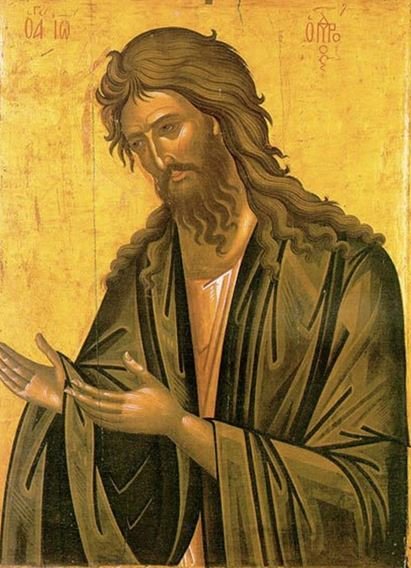 This coming week (June 24th) our Church celebrates the birth of St. John the Baptizer. Among all the saints whom the Eastern Church venerates, John holds a unique place. He alone, with the exception of the Mother of God, has feasts which honor his conception, birth and death (i.e., beheading). That he holds great esteem in the Eastern Church is seen in the fact that during the Church Year there are six specific feasts that are celebrated in his honor.
This coming week (June 24th) our Church celebrates the birth of St. John the Baptizer. Among all the saints whom the Eastern Church venerates, John holds a unique place. He alone, with the exception of the Mother of God, has feasts which honor his conception, birth and death (i.e., beheading). That he holds great esteem in the Eastern Church is seen in the fact that during the Church Year there are six specific feasts that are celebrated in his honor.
John is outstanding in the history of salvation because he stands on the border of the Old and New Testaments. He closes the doors on the prophets and opens them to the Apostles. He is not only a prophet but also a precursor of Christ, a baptizer and a martyr.
A direct relative to Jesus through the family of Mary, His mother, John serves as the one who prepares the way for the ministry of Jesus. In fact John is the first to articulate the theme of Jesus’ ministry: Repent (change your hearts and minds) for the Kingdom of God is at hand. We know that after John’s beheading, Jesus begins His ministry by proclaiming this same message!
The life of John was an unbroken chain of sacrifice and penance. He preached to the people new doctrines never proclaimed before by any prophet: a baptism of repentance, the nearness of the kingdom of God, the presence among them of Jesus, their Messiah and Savior. He truly prepared the way for Jesus!
We know that John fearlessly exposed and denounced all sin and scandal. He intrepidly addressed the proud Pharisees and censured the royal house of Herod. His holy life and teaching was crowned by his heroic death – he was beheaded. He fell like a soldier at his post, giving up his life for the highest ideals: the service of God and his people. Therefore, he remains for all times an everlasting symbol of a heroic champion of all that is holy, courageous and sublime.
In the East, the cult of St. John is very ancient and popular. His nativity, the feast that we celebrate this coming week, is the greatest of all the feasts that are dedicated to him. It was already known in the fourth century. The feast of his nativity replaced the pre-Christian feast of kupalo which was celebrated in the Slavic lands – a feast which ended the summer solstice cycle. This feast dealt with honoring the sun as the life-giver. It is fitting that John’s birth has taken the place of this feast!
